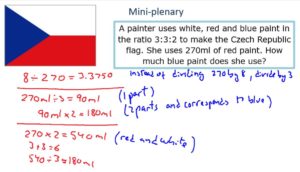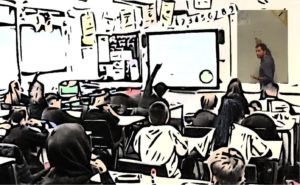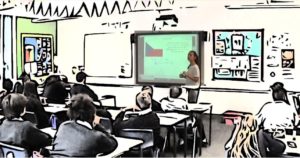Written by Pete Wright
Introduction
The Visible Maths Pedagogy project is a collaboration between Dr. Pete Wright (UCL Institute of Education), Alba Fejzo and Tiago Carvalho (mathematics teachers at Stoke Newington School) which began in November 2017. The study focuses on developing strategies for making teachers’ pedagogy more visible so that students are more able to recognise their intentions as teachers. The project is situated in Stoke Newington School, a diverse comprehensive secondary school in Inner London with an above average proportion of students identified as Pupil Premium. The mathematics department at the school has recently incorporated a series of problem-solving activities into its scheme of work and is moving away from a rigid setting structure towards mixed attainment teaching. The school has a focus on developing ‘oracy’, which in the mathematics department includes teachers encouraging their students to express their reasoning through adopting ‘think, pair, share’ approaches. The project aims to explore the potential of strategies which make pedagogy more visible, particularly whilst adopting progressive teaching approaches, to reduce the large gaps in mathematics achievement existing between children from different socio-economic groups.
Strategies
The following five strategies for making mathematics pedagogy more visible were used during the first year of the project:
- ‘Advocating’: Following pair discussion, students are encouraged to present their partner’s ideas rather than their own. The teacher then discusses the reason for doing so with students. The rationale is to encourage students to engage with others’ ideas, communicate their own ideas clearly and to appreciate that there are multiple ways to solve a problem.
- ‘Separating’: The teacher draws a line down the middle of the board, separating it into two columns (without revealing the reason for doing so). As students present their solutions to a problem, the teacher records at least two ‘reasoning’ style responses on the left and at least two ‘working-out’ style responses on the right. This is followed by a discussion where the teacher asks students what distinguishes the responses in the two columns, leading on to a discussion of the difference between ‘reasoning’ and ‘working-out’, and finally why students thought the strategy was used. The rationale is to help students appreciate the importance of distinguishing between reasoning and working-out.
- ‘Scribing’: As students present their solutions to a problem, the teacher writes down exactly what individual students say, regardless of whether they are correct or incorrect. This prompts a discussion focusing on any ambiguities or errors in what is written down, before going on to discuss why the strategy was used. The rationale is to challenge the assumption that everything the teacher writes down is correct and to encourage students to decide for themselves if something is correct, and recognise errors and misconceptions.
- ‘Annotating’: A follow-up to the ‘scribing’ strategy in which the teacher encourages students to annotate a solution on the board and to highlight how the solution might be improved. This is followed by a discussion on why the strategy is used, i.e. to help students appreciate the value of using more precise mathematical language alongside (more informal) everyday language and to communicate their mathematical thinking accurately.
- ‘Classifying’: Students solve a series of problems and then sort them into types of problems with similar characteristics. They then identify which methods they might use to solve other problems similar to each type encountered, before discussing why it is important to be able to identify/classify different types of problems before attempting to solve them. The rationale is to help students appreciate the importance/value of knowing which mathematical procedure to apply in solving unfamiliar problems (often the greatest challenge they face).

Rationale
Many differences in achievement (e.g. between boys and girls) have narrowed over recent years, however socio-economic disadvantage remains the most decisive factor in determining success in school mathematics. This is despite numerous government policies aimed at highlighting and reporting differences in attainment, such as the ‘pupil premium’ grant, introduced in 2011, which targeted resources at pupils eligible for Free School Meals. There is evidence that ‘progressive’ teaching approaches, characterized by collaboration between learners, open-ended inquiries, and an emphasis on developing problem-solving and reasoning skills, can lead to more equitable outcomes and greater levels of engagement amongst students. There is also a danger however that students from less wealthy backgrounds can be further disadvantaged when teaching is less structured, as is often the case with progressive approaches. These students are more likely to misinterpret the intentions of the teacher or to miss the point of the lesson.
Methodology
The Visible Maths Pedagogy project makes use of a participatory action research methodology, and draws on the following research tools:
- Critically reflecting on existing classroom practice by engaging with relevant research literature.
- Carrying out a series of plan-teach-evaluate cycles in which strategies are designed, tried out, evaluated, and further refined.
- Surveys and interviews conducted by teachers with students to provide evidence for evaluating the success of the strategies.
- Using video-stimulated reflection, peer observations and research journals to evaluate the strategies and reflect critically on classroom practice.
Findings
Early findings from the project have shown how the strategies were successful in enabling students, particularly those from disadvantaged backgrounds, to develop a greater appreciation of the rationale behind the teacher’s pedagogical choices. At the beginning of the project, students commonly misinterpreted the teacher’s intentions, often attributing the teacher’s pedagogical choices to an attempt to better manage students’ behaviour. However, over the course of the project, they developed a greater appreciation of the reasons why teachers adopted progressive teaching approaches and were able to respond more appropriately in less structured classroom situations. Feedback from students suggested they recognised the value in holding discussions around the rationale behind teaching approaches, allaying teachers’ concerns that they might not immediately see the benefits of doing so, and this appeared to have a positive impact on their motivation and engagement. They also began to articulate more clearly how they needed to respond to progressive pedagogies to become successful mathematics learners. The project also had a noticeable impact on the teacher researchers who, through holding discussions with students about their pedagogical rationale, and reflecting critically on classroom practice, found that they developed a clearer understanding of the theories underpinning the progressive teaching approaches they were using.
Dr Pete Wright
Lecturer in Mathematics Education
UCL Institute of Education
pete.wright@ucl.ac.uk

